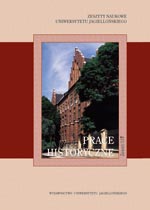Between a Tribute of Adoration and Ideological Distance. On the Kraków Celebrations of the 100thAnniversary of Juliusz Słowacki’s Birthday
Między hołdem uwielbienia a programowym dystansem. O krakowskich obchodach setnej rocznicy urodzin Juliusza Słowackiego
Author(s): Krzysztof Karol DaszykSubject(s): History
Published by: Wydawnictwo Uniwersytetu Jagiellońskiego
Keywords: Polish history; general history; ancient history; medieval history; modern history; contemporary history; political history; military; economic and social history
Summary/Abstract: Juliusz Słowacki was a poet who remained until the day of his death in the shadow of the Great Foremost One, as Adam Mickiewicz was called. It was not until the following generations started to know and understand him better that he was elevated to the rank of the nation’s „forerunner”. This advancement took place at the beginning of the 20thcentury upon the initiative of neoromantic artistic milieus (Young Poland movement) fascinated by the extraordinary breadth of vision and the power of imagery present in Słowacki’s poetry. The other group who placed him on the pedestal were young people calling for liberation of Poland. They reacted arduously to Słowacki’s cry for going „one by one to death, / As stones thrown by God at the rampart!…” in the name of freedom for their motherland (the quoted passage comes from the poem „My Testament”). In 1909, the year of the 100thanniversary of Słowacki’s birthday, both groups mentioned above took the opportunity to pay tribute to the poetic genius as well as to demonstrate patriotic feelings and striving for liberation. More than one thousand various anniversary celebrations were organized in 550 places within the former borders of Poland and in other countries. This article discusses the Kraków celebrations of the 100thanniversary of the „second bard’s” birthday. The author is less interested in the particular events themselves and more in the ideological atmosphere pervading these celebrations, since, as it has been revealed, „the spirit of Juliusz Słowacki” in 1909 was more a spirit of discord than of concord… The reason for such a state of affairs was that many readers at that time considered the author of Kordian to be an „emblem” of certain ideological and political values, including the independence of Poland, for whom one should always fi ght until the last drop of blood, republicanism, democracy, in a word, progress in political and social life. Those values were unacceptable at Kraków’s aristocratic palaces, bourgeois salons and the Dual Monarchy institutions loyal to Vienne. In consequence, the members of those infl uential Cracovian circles ideologically distanced themselves from „the most romantic one among the romantics”.
Journal: Prace Historyczne
- Issue Year: 137/2010
- Issue No: 1
- Page Range: 97-122
- Page Count: 26
- Language: Polish

